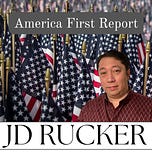It's important to know something up front. I have NOT been a "Chicken Little" who was screaming about economic collapse for years. I didn't panic for Y2K. I didn't panic during the economic downturn of 2008-2009. I didn't freak out over Obamacare, at least not from an economic perspective. I believed that we could recover from the 2020 lockdowns. But by mid-2021 I finally started getting truly concerned and throughout 2022 I've been monitoring the nation's economy very closely.
Now, I'm ringing the alarm bells because the threat of full-blown global economic collapse is real as we go into 2023.
On today's episode of The JD Rucker Show, I covered several stories that highlight the dangerous trends we're seeing. Unfortunately, the Biden-Harris regime seems bent on making things even worse and the new Republican majority in the House doesn't seem willing or able to do much to stop it.
One of the prevailing stories giving people hope for the past couple of months is better-than-expected stock performance. Is this a sign that the tide is turning? According to Bloomberg and Zero Hedge, no. It's just a sign that markets expected good things to happen. Since they haven't, we shouldn't anticipate a stock market that continues to overperform:
Two Great Months for US Stocks Promise Too Much for Own Good
The markets have been front-running the idea of a Fed pivot for some time now. While that is far-fetched, one must still admit that a Fed pause after its funds rate reaches circa 5%-5.25% is very much on the cards. While pretty much everyone in the markets is primed for the idea of a US recession, November’s non-farm payroll numbers (and perhaps even more importantly, the hourly earnings rising at twice the forecast pace) suggest that this inflationary episode may be around longer than realized.
And that is a worse denouement than any stock investor would wish. Not only do you have a scenario where inflation is corroding the nominal coupon on stocks, but you also have to factor in a slowing economy where presumably there is also a drag on earnings. A scenario that weighs on both the numerator and denominator (a high interest-rate recession) is hardly a prescription for a stellar rally month after month.
At current levels, the S&P 500 offers an estimated earnings yield of around 5.40% and the Nasdaq 100 around 4.32%, hardly anything to write home about in an environment where you can invest in two-year Treasuries that offer 4.27%.
Yes, there may be something to be said for being a part of that smart-money brigade that has made a grand return of 20%+ within a quarter and fleeing to where the honey is next, but that is predicated more on getting the timing right -- an iffy proposition even with the most seasoned investors. For every one idea that works out as per plan, the nine that follow come a cropper. [read more]
Costco Reports Large-Scale Shortages as Essential Items Are Impossible to Find at Stores
On the second segment of today's show, I turned to the "Epic Economist" to deliver a dose of reality about Costco. It's a financial indicator some use to see what's really happening with the supply chain and the retain market. Here's a transcript followed by the individual video I played during today's show:
The pantry of most American families today is probably looking a lot different than it was just a few months ago when grocery prices were lower and we still could find the majority of the products we usually rely on in our day-to-day lives. But now, shoppers are increasingly noticing the ongoing shortages at their favorite stores. With supply chain problems still impacting the production and delivery of goods, and mass migrations of employees searching for better wages resulting in labor shortages in the food sector, many of our favorite staple items are becoming harder to find. And that’s especially true at Costco.
In fact, new reports reveal that Costco warehouses are facing many different shortages, and dozens of products are about to be discontinued. Costco customers are getting more and more frustrated as they see essential items disappearing from the store’s shelves and start facing purchase limits once again. Today, we decided to track some of the most severe product stockouts and also expose which items may disappear next.
In recent months, American shoppers have been repeatedly reporting missing grocery items at their local Costco warehouse. But things seem to have taken a turn for the worse in October when several food products that were supposed to enter our food supply chains never arrived. We had a year of historical crop losses due to extreme weather conditions. The worst drought ever seen in this century resulted in some of the weakest harvest seasons in nearly five decades.
The scorching temperatures also led our beef cow herd to rapidly shrink, as farmers sent their animals to slaughter earlier than they typically do to prevent them from dying of thirst and starvation amid dwindling supplies of water and cow feed. You also probably heard about the avian flu epidemic, which is not only leading to shortages of chicken but also pushing poultry and egg prices to skyrocket The result of all of these losses is now being seen at the stores in the form of empty shelves.
Even major grocers like Costco are struggling to keep shelves fully stocked and announcing that in the coming months, many items will be discontinued. That’s why we decided to analyze data provided by Eat This, Not That, a leading news outlet in food, nutrition, and health, to track which are the most persistent grocery shortages at the retailer’s locations and what items are about to go out of stock.
The company just announced that dozens of products are being discontinued over the next few months. This means that your favorite treats may disappear from the store and not come back. A new report exposed that you may have to say goodbye to a wide range of treats that the retailer decided it will no longer sell. Knowing that some of your favorite items are going to be discontinued is one of the most disappointing experiences as a grocery shopper.
At the same time, it looks like purchasing limits are back with a vengeance. When searching the warehouse's website for "limit", we found dozens of items, ranging from active dry yeast at five per member, to almond flour at one per member, to acetaminophen at one per member, several types of wild canned tuna at one per member, mac and cheese at 10 per member, to soy milk at two per member, and many more. Retailers haven’t been able to catch a breath these days. The environment for most businesses remains tough, and as this downturn accelerates, they will continue to see their bottom lines getting hurt, and the same will be true for our personal finances.
Could 65 Trillion Dollars in “Hidden” Derivatives Cause the Entire Global Financial System to Crash?
If you thought that the collapse of FTX was something, just wait until the entire global financial system comes crashing down all around us. Most people just assume that the system is being managed by rational people that behave in rational ways, but of course countless investors assumed the same things about FTX. Sadly, the global financial system has slowly but surely been transformed into the largest casino in the history of the world. It is a colossal Ponzi scheme, and once in a while authorities give us a little peek into what is really going on behind the curtain.
For example, this week the Bank for International Settlements released a report that warned that 65 trillion dollars in “hidden” currency derivatives could potentially be a major threat to the stability of the entire system…
There’s a hidden risk to the global financial system embedded in the $65 trillion of dollar debt being held by non-US institutions via currency derivatives, according to the Bank for International Settlements.
In a paper with the title “huge, missing and growing,” the BIS said a lack of information is making it harder for policy makers to anticipate the next financial crisis. In particular, they raised concern with the fact that the debt is going unrecorded on balance sheets because of accounting conventions on how to track derivative positions.
Last year, the total value of all goods and services produced in the entire world was just 96 trillion dollars.
So we are talking about an amount of money that is almost unimaginable. [read more]
The Bubble Economy's Credit-Asset Death Spiral
Understanding why those in the financial industry aren't ringing the alarm bell takes one simple revelation. Even as economies begin collapsing, THEY'RE still making plenty of money. The messes that are being made are mostly affecting the middle class. Even those with modest wealth are feeling the crunch. But the real money players are benefitting greatly. We discussed this a bit on the episode with an article by Charles Hugh Smith from Of Two Minds via Lew Rockwell:
Who believed that central banks’ financial perpetual motion machine was anything more than trickery designed to generate phantom wealth? Central banks seem to have perfected the ideal financial perpetual motion machine: as credit expands, money pours into risk assets, which shoot higher under the pressure of expanding demand for assets that yield either hefty returns (junk bonds) or hefty capital gains as the soaring assets suck in more capital chasing returns.
As assets soar in value, they serve as collateral for more credit. Higher valuations = more collateral to borrow against. This open spigot of additional credit sluices capital right back into the assets that are climbing in value, pushing them higher–which then creates even more collateral to support even more credit.
This self-reinforcing feedback of expanding credit feeding expanding valuations feeding expanding collateral which then feeds expanding credit has no apparent end. Modest houses once worth $100,000 are now worth $1,000,000, and nobody’s complaining except those priced out of the infinite spiral of prices and credit.
For those priced out of traditional assets, there’s NFTs, meme stocks and short-duration options. The credit-asset bubble-economy casino has a gaming table for everyone’s budget and desire to “make it big” via speculation, since the traditional ladders to middle-class security have all been splintered.
This financial perpetual motion machine distorts traditional incentives. Why bother renting a house bought for speculative gains? Renters are problematic, better to just let it sit empty and rack up huge capital gains. Count the lighted windows at night in all those new condo high-rises. Are even 20% occupied? Probably not.
This is how you get a “housing shortage”: investors would rather keep units clean and off the market rather than risk renting units. When credit and asset valuations are both feeding an infinite expansion, all that matters is leveraging capital to acquire as many assets as possible to maximize the gains from this self-reinforcing wealth-creation machine.
This machine also incentivizes fraud. To really maximize gains, why not borrow clients’ capital? Indeed, why not? But unbeknownst to the central bank sorcerers and the greed-crazed participants, all systems have limits and all consequences have their own consequences, i.e. second-order effects. There are many such dynamics which are eroding the apparently unbreakable financial perpetual motion machine. [read more]
Our Gold Guy
In the 4th segment, I replayed an interview with Ira Bershatsky from Our Gold Guy that I recorded last week. Here's what he has to say on his website:
Look around. Things aren’t the way they should be. Between Pandemic Panic Theater, Ukraine, food shortages, and a push for Central Bank Digital Currencies, everything you’ve spent your life building and protecting is in jeopardy.
Precious metals are historically the most reliable and safest hedge against economic turmoil. With the Biden regime and globalists enhancing the chaos, it’s important for patriotic Americans to take control of their financial future.
Ira Bershatsky offers consultations to those who want to invest in precious metals. During these consultations, he will match your current financial situation with the best physical precious metal purchases whether you want to rollover your IRA or have coins discreetly shipped to your home. You will not talk to a telemarketer or sales rep. You will talk to a true expert in precious metals with decades of experience helping people protect and advance their wealth.
Central Bank Digital Currencies With Brannon Howse and Congressman Glenn Grothman
The fifth segment had me turning to my good friend Brannon House and his interview of Congressman Glenn Grothman.
The Biden-Harris Regime Quietly Changes Rules to Incentivize Financial Advisors to Put Your Money Into Woke Investments EVEN IF IT LOSES MONEY
It's no secret that the Biden-Harris regime and their puppetmasters among the globalist elite cabal absolutely hate us. They despise us as useless eaters who must be depopulated or controlled for them to achieve their nefarious goals of The Great Reset, the 4th Industrial Revolution, Build Back Better, the Green New Deal, the Liberal World Order, or whatever label they slap on their machinations in the future.
Now, they're proudly declaring this hatred by prompting financial advisors and retirement institutions to move your money to ESG companies. Moreover, they lifted rules requiring them to try to make you money. In other words, they can lose money for YOU and still make money for themselves as long as they're investing in wokeness. You can't make this up, but apparently someone among the powers-that-be did anyway.
According to Jeff Murdoch at The Washington Times [emphasis added]:
The Biden administration has quietly finalized a rule allowing employers to funnel workers’ 401(k) funds into investments that support woke causes that address issues such as climate change and diversity.
The Labor Department recently approved the rule affecting roughly 150 million workers and $10 trillion in assets covered under the Employee Retirement Income Security Act of 1974.
The rule says asset managers and retirement plan administrators should consider environmental, social and corporate governance (ESG) factors when selecting investments. That would encourage money managers to balance financial returns with investments that support wind and solar energy or have diverse boards of directors.
The rules also remove a restriction blocking employers from using an ESG fund as a default option for workers automatically enrolled in 401(k) plans. That means workers could be supporting causes that don’t align with their political views.
It also rescinds Trump-era regulations that require retirement plan administrators and asset managers to choose investments based solely on participants’ financial interests.
This is just another reason why I STRONGLY recommend everyone of all ages move their wealth or retirement into a self-directed IRA. Don't let advisors and retirement companies quietly compel you to lose money on woke investments even as they make more money thanks to the Biden-Harris regime's priorities.












Share this post